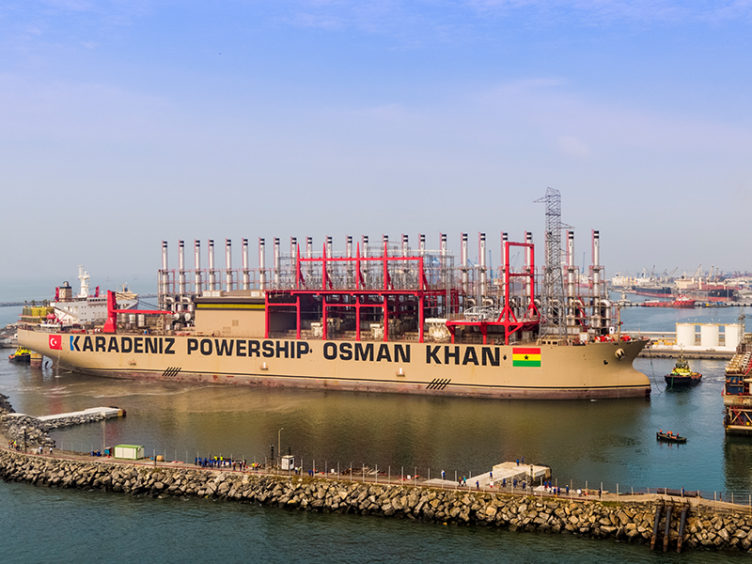
DNG Power has objected to its disqualification in South Africa’s emergency power tender, alleging wrongdoing by a number of parties.
An affidavit from DNG’s CEO Aldworth Mbalati, seen by Energy Voice, set out a number of issues with the way in which the Department of Mineral Resources and Energy (DMRE) carried out the tender.
The ministry ultimately named Karpowership SA as the preferred bidder, in March. The company has denied any impropriety.
The DMRE set the Risk Mitigation Independent Power Producer Procurement Programme (RMIPPPP) deadline for October 30, 2020. As the tender was about to close, at the end of the day, the DMRE extended the window by a month.
The ministry granted the extension as a result of “undue interference by third parties”, the statement said.
DNG submitted its bid for the original deadline. There was a risk “that aspects” of its offer were “disclosed to competitors in order to assist them” in their bidding.
The authorities should consider DNG’s bid for preferred bidder, it continued.
Financial close for the project is expected to be around the third week of July, and no later than August 11. DNG is seeking a court ruling to reconsider the preferred bidder award.
The RMIPPPP sought to secure supply of 2,000 MW for 20 years.
Power plans
DNG had set out a plan to build three gas-fired power plants onshore. The company has a licence to import LNG and it has offered to supply 1,300 MW of power within 18 months of breaking ground.
Karpowership SA’s winning bid will provide three power vessels, with 1,220 MW. DNG criticised DMRE’s choice of the powerships. Such facilities should only “supply temporary relief in crisis situations”, the affidavit said.
The company also criticised the Karpowership bid on the grounds that the ships would not be built locally and so would therefore not provide the economic stimulus to the country. The tender document required bidders to build equipment in South Africa.
South Africa’s DMRE changed the tender “at the request of and/or in a concerted effort” to assist Karpowership, the affidavit said.
A Karpowership representative denied the DNG claims to Energy Voice.
“We strongly reject the allegation of impropriety on the part of Karpowership SA and as a consortium of local and international investors we have every confidence that the South African courts will deal with this appropriately. All bidders followed the same transparent process and Karpowership SA was awarded bids because we provided the best combined package of affordability, technology, and economic development in compliance with all regulatory requirements.
“The false allegations levied by a failed bidder are alarming. It is right to have robust debate around the best options for South Africa’s energy future, but these debates should be fact-based.”
Ownership
Other allegations raised by Mbalati include waivers of local content requirements. The exemption “causes me to (verily) believe that this local content exemption was unlawfully and/or irregularly granted”. DNG, on the other hand, could meet and exceed the 40% requirement, it said.
South African ownership in DNG is 60%, it said, with approximately 48% local content. The affidavit claimed Karpowership SA, on the other hand, had applied for a 100% exemption on this requirement.
A South African group owns a 49% stake in Karpowership SA. Turkey’s Karadeniz Holding holds the remaining 51%.
The competition has allowed the preferred bidders “to circumvent the true spirit purport and objects” of the tender, the DNG executive said.
Opting for DNG over Karpowership SA would save the country a projected $2 billion over 20 years. On a $25 per barrel Brent price, DNG would charge 1,324 rand ($91.3) per MWh. Karpowership SA would charge 1,536 rand ($105.9) per MWh, DNG said.
The system
Mbalati goes on to allege that he was approached by a businessman connected to Minister of Mineral Resources Gwede Mantashe. The CEO does not name the man but goes on to say the tender’s outcome had already been determined.
The businessman and a senior DMRE official talked about how they could the DNG bid, the CEO said. Mbalati said the company did not need this help. His counterparts responded with “anger and vitriol”.
A DMRE official told Mbalati to fall into line. There is a “system in this country and if you don’t work in accordance with that system, you will fail, even if your project is the best”.
In March, the businessman got in touch with Mbalati again and said DNG had won the bid. However, if the DNG CEO did not co-operate, the company would receive nothing.
Mbalati declined to co-operate and subsequently discovered that the DMRE had disqualified DNG.
